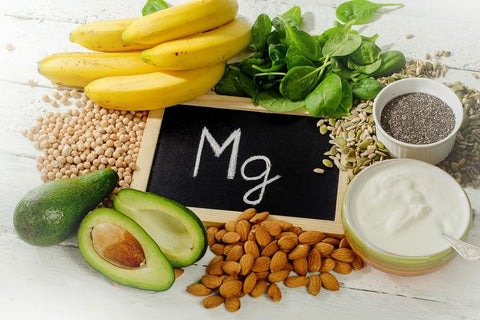With age comes wrinkles, hearing loss, frequent forgetfulness and the occasional grey hair… however, aging can also bring with it nutritional deficiencies. This is where the supplements you could take after turning 50 come into play.
After age 50, magnesium is one of the micronutrients that should not be lacking.
Magnesium
Magnesium is necessary for more than 300 biochemical reactions in the body.
It helps maintain normal muscle and nerve function, supports a healthy immune system, keeps the heartbeat steady, and helps bones stay strong. It also helps regulate blood glucose levels. It helps in the production of energy and protein.
There is ongoing research into the role of magnesium in preventing and managing disorders such as high blood pressure, heart disease, and diabetes.
A 2021 study published in “Nutrients”, https://www.ncbi.nlm.nih.gov/pmc/articles/PMC7912123/ reports that cardiovascular disease, high blood pressure, stroke, and Alzheimer's have been linked to magnesium deficiency.

Benefits of magnesium for our health
1- Reduces stress: It helps regulate certain hormones, such as cortisol, the stress hormone, so it is beneficial to reduce the level of this hormone in the body and avoid the consequences of chronic stress, such as hypertension, chronic irritability or depression.
2- Helps you sleep: Magnesium deficiency alters melatonin, the hormone responsible for regulating our biological clock; it makes us sleepy at night when the amount of melatonin in our body increases, and makes us wake up when it decreases.
3 - Reduces menstrual cramps: When we are stressed, the body prioritizes blood flow to the muscles and paralyzes physiological functions. These tensions cause menstrual pain and irregularities in the cycle.
4- Increases sexual desire: stress and tension decrease libido and the desire for sex, so reducing this problem will also increase our sexual desire.
5- It benefits the cardiovascular system: by reducing blood pressure, it decreases the risk of developing cardiovascular diseases such as heart attacks.

6- Improves mood: Magnesium also regulates serotonin levels, a neurotransmitter also known as the happiness hormone because it makes us feel good.
7- Prevents cramps: Magnesium relaxes muscles, preventing muscle cramps.
8- Strengthens bones: Magnesium helps to fix calcium and phosphorus correctly by stimulating the hormone calcitonin that helps calcium absorption. Magnesium stimulates bone creation and participates in the activity of vitamin D.
9- Prevents cavities: Magnesium deficiency unbalances saliva and makes it corrosive to teeth.
10- Alkalizes the body: Magnesium helps restore the alkaline pH to our blood plasma.
11- Hydrate: Magnesium is an essential electrolyte for proper hydration.
12- Relieves constipation: Magnesium chloride has osmotic capacity, thus softening stool, which helps evacuation, and also has a stimulating effect on peristalsis (bowel movements).
13- Reduces heartburn . It is usually administered in the form of magnesium carbonate, which has a more alkaline pH and is therefore effective at neutralizing stomach acid.
14- Improves diabetes: magnesium improves insulin production since without this mineral glucose is not able to be transferred to the cells.
15- Reduces migraines. According to various studies, magnesium supplementation – oral and intravenous – reduces the frequency and intensity of migraine attacks.

Foods with magnesium
Whole wheat . Any food containing whole wheat flour is a great source of magnesium. 100 grams of this product contains 167 mg of this mineral. It can be found in bread, pasta or cereals, as long as they are 100% whole wheat.
Almonds, walnuts and pistachios are rich in vitamin E and magnesium. 100 grams of these products provide 120 mg of this mineral.
Flax seeds : they are a source of omega 3, fiber and vitamin B1, essential for producing energy. With just 100 grams of these seeds we can cover 100% of the RDI of magnesium.
Spinach and chard : In addition to being an inexhaustible source of iron, 100 grams of spinach contain 79 mg of magnesium. Swiss chard, on the other hand, provides us with 38% of the RDI in just one cup.
Avocados: In addition to being healthy (because they are rich in monounsaturated fat), avocados are rich in magnesium. A 200g avocado provides 15% of the Recommended Daily Allowance.

Legumes : such as lentils, beans or chickpeas. These foods provide the amount of iron, fibre and vitamins that we need. They also help us to cover our magnesium needs, providing between 120 and 140 mg per 100 grams.
Banana : the main properties of this fruit are its high magnesium and potassium content. It is very beneficial after physical exercise as it promotes good muscle function.
Sunflower and pumpkin seeds : They are an undisputed source of magnesium. 100 grams of sunflower seeds contain 325 mg of this mineral, 82.8% of the RDI, as well as being rich in vitamin E, calcium, phosphorus and fatty acids. In turn, pumpkin seeds provide us with 360 milligrams of magnesium with this same amount.
Dark chocolate: It must have a minimum of 70% cocoa, and about 30 grams of dark chocolate provides around 65 milligrams of magnesium.
Oats: In addition to providing 177 mg of magnesium per 100 grams, they are a source of protein, fiber, potassium, calcium and B vitamins.
Are magnesium supplements necessary during menopause?
While it is true that all people need magnesium to maintain the functions of magnesium in our body , women require this mineral even more due to the hormonal changes we experience at certain stages such as menopause.
For example, magnesium strengthens bones and joints, which can help prevent the development of osteoporosis. It also helps bind phosphorus to bones, which in turn helps strengthen them and preserve and repair cells and tissues.
In addition, magnesium helps balance certain hormones , such as cortisol, which helps to calm nervous stress and anxiety, which are common during menopause.
And, in the face of perimenopause and menopause, this nutrient helps produce hormones such as progesterone, testosterone and estrogen , which helps relieve symptoms typical of this stage such as hot flashes.

Finally, magnesium can give you that extra energy you need at this stage.
In general, a healthy diet would cover our needs , but at certain stages of our life, such as menopause, it may be advisable to consume magnesium supplements. They are especially useful for people with unbalanced diets, digestive problems due to malabsorption, chemotherapy treatments, use of diuretics, diabetics or athletes who consume a lot of magnesium when practicing sports.
https://www.institutodelamenopausia.com/divulgacion/tratamientos/suplementos/beneficios-del-magnesio-para-mujeres-de-mas-de-50-anos
https://mejorconsalud.as.com/6-alimentos-aumentar-magnesio-la-dieta/
https://medlineplus.gov/spanish/ency/article/002423.htm
https://mejorconsalud.as.com/suplementos-tomar-despues-cincuenta-anos/



Comments (0)
There are no comments for this article. Be the first one to leave a message!